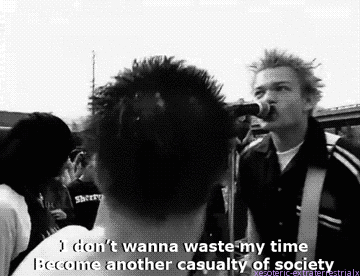#learning french

Does anybody know the difference between these words? Is there a difference in meaning or is there like a grammatical form I’m blanking on?
Fat Lip Vocab
casualty- une victime, qqn ou quelque chose blessé ou perdu (typiquement en guerre ou catastrophe naturelle)
victim- une victime
society- la société
old people- personnes âgées
mullet- une nuque longue
brat- un gamin
abortion- un avortement
to be sick of- en avoir marre de
to waste time- perdre du temps
to crave- désirer, souhaiter ardemment
to fall in line- rentrer dans le rang
don’t count on me- ne pas compter sur moi


Puis il y avait de la chaleur,
un bassin de beauté trouve en vous;
dans votre toucher, votre sourire.
Votre amour m’a apporté la magie
à ma vie, même quand je pensais
que j’étais perdu dans les falaises;
perdu aux fins.
Then there was warmth,
a pool of beauty found within you;
within your touch, your smile.
Your loving me brought magic
to my life even when I thought
I was lost to the cliffs;
lost to the endings.
ReBecca DeFazio
More Than a Flower
Guide to Granola Academia aesthetic pt. 3
Movies:
- Moonrise Kingdom (2012)
- Emma (2020)
- Big fish (2003)
- Dead poets society (1989)
- Ghostbusters (1984)
- Jurassic park (1993)
- Pride and prejudice (2005)
- Groundhog Day (1993)
Is there something like Granola Academia aesthetic and can we start making it a thing? Anyways, there it is:
Guide to Granola Academia
- Vibe: having strong opinions and expressing them, love bieng outdoors, drinking ungealthy amounds of coffee, vintage, loving outdoors, bringing books everywhere, riding bike instead of using a car, lying to yourself that you can focus while listening to music, loving libraries
- Clothes: Jeans, TURTLENECKS, oversized blazers, wide high waist pants, corduroy, collared shirts, v-neck sweater, Oxford shoes, The North Face, Patagonia, beret, flat cap
- Avtivities: studying until 3am, visiting your grandma, crocheting, hiking, reading books, going thrift shopping, baking cookies for your friends, horse riding
- waking up before everyone else, taking shower and celebrating every day
- Food: GRANOLA, oatmeal, risotto, coffee, coffee, coffee, tea with milk (or without), homemade cookies, cottage cheese, literally anthing vegan
- Music:







Source of photos: Pinterest
And when Benedict Smith said:
“I wish I wrote the way I thought
Obsessively
Incessantly
With maddening hunger
I’d write to the point of suffocation
I’d write myself into nervous breakdowns
Manuscripts spiralling out like tentacles into abysmal nothing
And I’d write about you
a lot more
than I should”
I felt that
What i like the most about DA community is that everyone there does the most shitposting so the newest members van get into this aesthetic and know how they want to live.
Like, literally, so many moodboards and inspirational quotes, booklists on Pinterest, outfits, basically anything you want to know abt DA. Oh, and I would have forgotten, literally half of Tumbrl is Dark Academia
When I’m feeling good about my French speaking

vs
When I make an obvious mistake and freeze

Hey Tumblr !
I just made my very first YouTuve video. I’ll be making more French tutorials. If you’re interested please subscribe or leave a comment :)
There is NO hard language, just different ones. Even the hardest language is just average difficult.

As many of you know there are 5 groups of languages for English native speakers based on “how hard” a language is.
With group one being the easiest (languages like Spanish, French, Italian, etc.) to group five including the hardest (like Chinese, Japanese, Korean, etc.).
But to which group a language belongs can change drastically based on which languages you speak or are interested in.
So let’s take a look at “how hard a language is” when you actually don’t know a single language at all.
When learning their mother tongue, it’s all the same, all around the world. Kids can express themselves in an easy way at the age of 4 to 5. At this point they can tell you stories about what happened during the day, follow commands that include multiple steps (like go brush your teeth, then change clothes, go to bed, etc.) and also strangers should be able to understand what the kid is saying. So the kid is at a level what we would consider fluent but not at a high native speaker level, because it can’t understand complex topics. A kid is starting to actually try talking when it’s around 6 months old.
So as a result we can say if you don’t know any language at all you need around 4 years to learn it in a way, to be conversational. And you have to keep in mind that for the first language kids have the URGE to learn it, because otherwise they don’t “belong” to the group and humans are social animals. They can’t just switch to their native language if they don’t want to learn anymore. If they want to talk to ANY person, they HAVE TO learn their first language. It’s socially necessary and back in time an important step of survival.
So let’s say if you don’t know any other language and have a very important reason for learning one AND are surrounded by it non stop with people trying to talk to you ALL THE TIME, you will need 4 years to be on a decent conversational level.
So if we take a look at the 5 groups of languages, even the hardest ones don’t take adults THAT long.
And adults have the opportunity to have social contact without their target language.
Even if you don’t “need” your target language, people of this language aren’t trying to talk to you all the time and you’re not surrounded by it non stop, adults are able to reach an even higher level as “conversational” in this time span.
So it’s not like the “hardest” group of these language rankings is actually hard, it’s just closer to “learning from scratch” because it’s not closely related to the language you know. And even then you’re still faster than having to learn a language totally from point zero because you already learned how a language in general works.
The result is, the hardest group is more like the normal group and everything else is just “how much faster and easier will it be based on what I already know”.
So don’t scare yourself with stuff like “oh my god, everyone says it’s such a hard language… can I even learn it?”. Yes, you can. You will even learn it faster than native speakers without having the language surrounding you 24/7. If 4 years olds can learn it, every adult can learn it. And it’s NOT(!) a hard language! It’s just harder than the other ones and ONLY(!) because you already have a great advantage when it comes to the other languages. But the level of difficulty, even for the hardest language is actually just “normal”.
And it’s annoying that people keep talking about such called “hard languages”. Theres just an average difficulty and everything else are just extra points you gained through your native language that makes specific languages EASIER for you.
Let’s look at it like that:
With every language you start at 0% (what every kid no matter which language they’ll learn as their native language does).
The closer your target language is to the languages you know, the higher your start percentage is.
For example if you’re Korean learning Japanese, the grammar is quite similar so you already start with 20%.
If you’re Spanish and learn Italian you even have many words in common, so you start with 30%.
(Btw the percentage numbers are just random numbers to show what I mean, they are not fact numbers.)
If you’re Russian you’ll start with 10% when learning German because you already know how cases work.
And so on. It works with EVERY language. If you know genders, cases, conjugation, etc. and your target language includes that, you don’t have to figure out how it works, you already know it. Sure you often have to learn new words for that but it’s not like you have to figure out the system behind that.
So the absolute WORST case could only be to start at 0% (what you probably never will because in the very basic every language is the same, for example trying to talk about a subject, etc. You already know the purpose of a language.) BUT you will NEVER(!) start with minus percent. So stop freaking yourself out. There is no hard language, just a more different system you have to get used to.
It’s not hard if everyone, literally everyone, can learn it. Especially millions of 4 years olds. Don’t give up just because you make mistakes or don’t get the hang of something right away.
Every kid needs around 4 years to speak the absolute same stuff, no matter which language (not including writing system in later years). So all languages have the absolute SAME difficulty when it comes to learning them. It just depends on what you already know, which can make it easier/faster.

Hello ladies and gentlemen, I hope you all are having a wonderful day. :)
Lately I’m thinking about learning two languages at the same time. Usually I always was like “hell no, this is not going to happen” because I remember when I first tried doing this (without a plan or any knowledge how I could do that) I failed. Like really hard. I always switched up words and grammar, because I was learning them literally AT THE SAME TIME. For example when I tried to learn a new word, I learned it for language A and B simultaneously. Later I didn’t know which word belonged to which language. Or if I knew it in language A I just couldn’t get away from this word. No chance to remember it in language B.
___________________________
So the goal is to separate them as much as you can! You want to learn them at the same time but NOT together. Make them as different as possible.. You want your brain to connect these languages with different things. Now, it’s time to take a look on how you can do that.
- Don’t start them at the same time. I know first it sounds strange if you want to learn two languages at the same time but you shouldn’t start both on the same day. Because right at the beginning you have to learn the same words like “hello, how are you, my name is, bye, etc.” and as I said you want to separate them as much as you can. Just pick one and concentrate on it for a few weeks (like one month or if you learn fast even less) and then start the other one. This way you already know the very basic stuff in language A and don’t confuse it with language B.
- Don’t take similar languages. The worse you can do is learning two similar languages. First it sounds like a good idea, because of similar grammar and especially similar words, which could make you think “this way I learn faster” but it’s NOT the case.
Italian and Spanish? Bad idea.
German and Dutch? Bad idea.
Russian and Ukrainian? Bad idea.
The best is to take languages that aren’t even in the same language family. - Take languages with different letters. This is a hack that can help you a lot. Especially if you are a visual learner, languages with different writing systems will make it nearly impossible to switch them up. I mostly learn stuff through seeing it. Like seriously, I can’t remember shit if I just hear it but I were able to learn 500 Spanish words for a test on the next day in 2 hours because I used a technique for visual learners. Of course I wasn’t able to keep all of them in the long term memory but it was enough to get an A. And I never ever switched up words (even if I learned them at the same day in two languages) if they were written in different letters, because if I remember a word, I see it in front of my inner eye. So to all visual learners: THIS is the best thing you can do.
- Use different colours and stick to them. For example always use blue for Russian and red for Spanish. It makes it easier for your brain to switch between them. You brain will associate the language with this colour. So if you switch from Russian to Spanish and your brain sees red it will automatically first use the connections it built up around this colour. And you connected Spanish with red. I don’t know how to explain that properly but if you see red your brain connects it with Spanish vocab because it’s “closer” than the Russian vocab.
- Use different times. Same as above. You connect one language with a specific time. For example after you get up in the morning you study Russian and before you go to bed you study Spanish.
- One of the languages should be a familiar one. This way you will have “less” work. For example if your native language is French then Spanish or Italian are good ones for you. But remember that the second language you chose should be as different as possible.
- Chose a main language. There will be a time when you question yourself, if this was a good idea. It will feel like you’re getting nowhere and of course you will think about if it’s because you don’t concentrate on one language. With a main language you will see more progress because you spend more time with it. A really great way to motivate yourself and if you don’t like the choice you made you can always take the other one as main language.
- Make a plan. I don’t know what else I could say about this because you probably all know what I mean. You have to make a plan WHEN you learn WHICH language for HOW LONG and WHAT you want to learn.
- Think in your target languages. As soon as you have an intermediate level, you can start using both languages at the same time and even practice them together. Try to translate from language A to language B. This way you can learn to think in your new languages because there is no need to think in your native language at all. At this point try to avoid your native language as much as you can.
- Take your time. You can’t expect to learn two languages as fast as you would learn a single one.
- Learn at different places. Same as the colour and time tip. Connect every language with another place. For example Russian is the living room and Spanish the kitchen. Or if it’s possible try to learn one of them at the library/park/etc.
- Connect them with emotions (and not only textbooks). For example speaking Spanish with your friends (happy, comfortable, etc.) and exploring Moscow while speaking Russian with the natives there (exited, nervous, etc.)
- Study both every day. I guess I don’t need to say more.
- Keep in mind that it’s even harder to keep your motivation. If you loose motivation in learning languages, it will be twice as hard to get back on track. Because everything will take twice as long. So if you find it hard to learn one language if you’re not motivated, you should consider learning one after another. Your progress will be slower if you learn two languages at once and if you’re not a person who can handle this, you should stick with one.
- Make everything different. I know I mentioned it a lot but just think about what you could change in your learning routine. You can help your brain to connect many things with language A or language B. You drink Cola while studying language A and tea while studying language B. Put a picture of Spain on your table while studying Spanish and one of Russia while studying Russian. Write with a black pencil in Spanish and with a grey one in Russian. Meditate before Spanish and work out before Russian (or other morning/night routines you do, followed by the language you want to connect it with).
I hope this post was helpful for you and keep in mind that if you just want to speak as many languages as possible, one after another will be faster. But if you want to learn both languages at the same time because you really like them, there is nothing stopping you. :)















